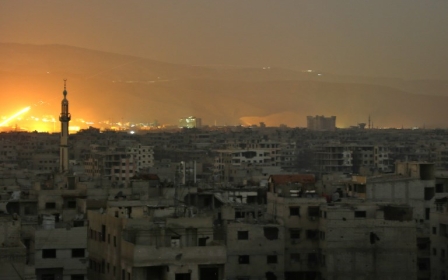Thousands of civilians flee southern Syrian towns as air strikes return

By Mohammed Al-Haj Ali, Waleed Khaled a-Noufal, Avery Edelman, Tarek Zaid al-Hariri and Sulaiman al-Ebrahim
AMMAN - Thousands of civilians are fleeing opposition-held towns along frontlines with Syrian government forces in southern Daraa province amid claims of an upcoming rebel offensive and the first pro-government air strikes there in approximately eight months.
“We have decided to launch a preemptive strike against the regime,” Abu Jawwad, a commander with the opposition’s Southern Front, told Syria Direct from the eastern Daraa countryside on Monday.
Military operations are set to begin “shortly,” he said.
'There was a lot of talk among civilians about a military operation. We grew more and more scared.'
- Alaa Sadqa, resident in western Daraa town of Ibtaa
The commander asked to be referred to by a pseudonym because he is not authorised to speak to the media. The Southern Front is a loose coalition of rebel factions that previously received substantial US funding through the Amman-based Military Operations Centre (MOC).
Syrian government warplanes bombed Daraa province for the first time in about eight months on Monday, conducting 10 air strikes on several towns and small cities in the province’s eastern countryside, local civil defence personnel and media sources told Syria Direct.
The strikes breached an uneasy calm in Daraa that was ushered in with a Russian-, US- and Jordanian-backed ceasefire agreement over Syria’s southern provinces last July. In the following months, thousands of displaced residents took advantage of a reduction in violence to return home.
Now, with the return of air strikes and possible new rebel activity in the south, Daraa’s relative calm could be in jeopardy.Southern Front commander Abu Jawwad told Syria Direct that his faction’s preparations to attack government forces came after they “received information suggesting that regime forces are preparing a military operation in southern Syria”. Syria Direct could not independently confirm the commander’s claim.
The Southern Front has not released any official statements regarding upcoming operations against government forces.
Pro-Assad military reinforcements arrived in Daraa province in January, Syria Direct reported. At the time, rebel commanders said they observed operations to raise earthen berms and reinforce military posts in Daraa city.
New military operations in southern Syria would also aim to “ease the military pressure” on the rebel-held Eastern Ghouta suburbs of Damascus, where an ongoing government assault claimed more than 1,000 civilian lives in recent weeks, commander Abu Jawwad said.
‘Heating up’
As rumours of a rebel offensive circulate, residents and local officials say thousands of civilians living in settlements near frontlines in the eastern and western Daraa countryside left their homes in recent days in anticipation of renewed violence.
Ahmad, a resident of the east Daraa town of Busra al-Hariri, told Syria Direct he decided to leave his home on Sunday after a local FSA faction encouraged residents to leave ahead of a potential military operation. He asked that his full name not be published, fearing repercussions for relatives in government-held territory.
Busra al-Hariri was one of the eastern Daraa towns hit by government air strikes on Monday.
Abu Jawwad, the Southern Front commander, confirmed that rebels conducted what he described as voluntary evacuations in several Daraa villages, including Busra al-Hariri, beginning late last week.
Ahmad’s family was one of an estimated 550 families - thousands of individuals - who have left Busra al-Hariri since Saturday, according to statistics provided to Syria Direct by the town’s local council. Most of the families travelled south, to other villages and cities in the eastern Daraa countryside, including al-Hrak, al-Jiza and al-Karak.
Hundreds of residents from several towns in the western Daraa countryside also fled the province for neighbouring Quneitra province over the past week, Abu Muhammad, director of the al-Karama displacement camp, told Syria Direct.
About 35 families from Daraa arrived at the displacement camp, Abu Muhammad said. Some of the displaced joined relatives already in the camp while others were given tents and water tanks. The camp turned away a second group of displaced Daraa residents, the director said, because it was at capacity.
“There was a lot of talk among civilians about a military operation,” Alaa Sadqa, a resident of the western Daraa town of Ibtaa told Syria Direct from the al-Karama displacement camp. “We grew more and more scared.”
Amin al-Marzouqi, a representative of the Daraa Provincial Council’s statistics office, confirmed “mass displacement” in some parts of the province.
Approximately 1,300 people left Daraa city over the past 48 hours, he said. The Statistics Office monitors provincial developments in coordination with local civil society and governance organisations.
“The region is heating up,” Southern Front commander Abu Jawwad said.
Syria Direct is a non-profit journalism organisation that focuses on coverage of Syria. Read the original article on Syria Direct. Follow Syria Direct on Twitter.
Stay informed with MEE's newsletters
Sign up to get the latest alerts, insights and analysis, starting with Turkey Unpacked
Middle East Eye delivers independent and unrivalled coverage and analysis of the Middle East, North Africa and beyond. To learn more about republishing this content and the associated fees, please fill out this form. More about MEE can be found here.






